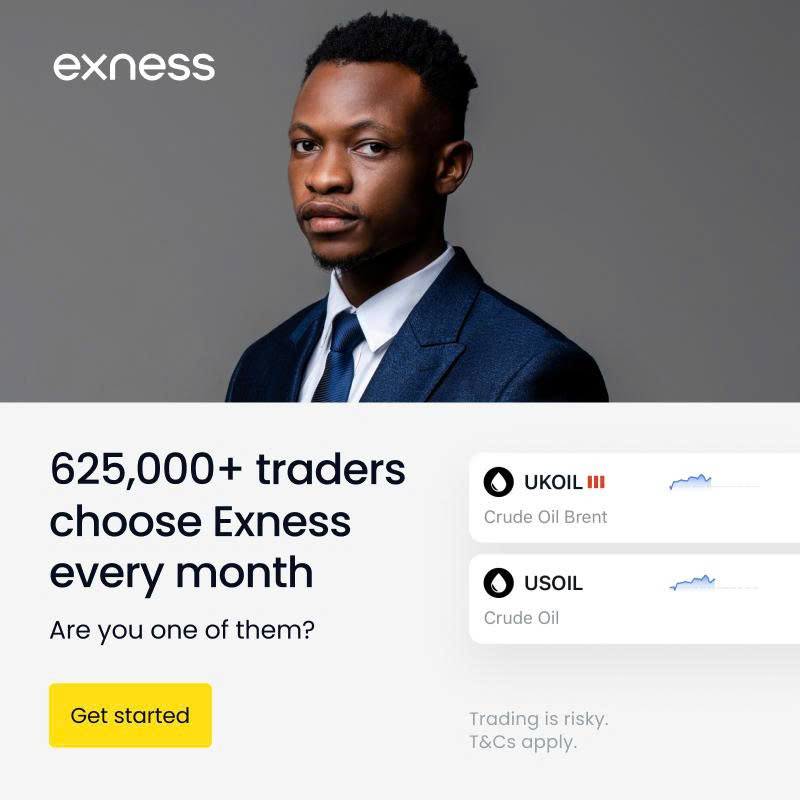
7 minute read
Is Forex Trading Legal in Kenya? A Comprehensive Guide for Beginners
from Forex Legal Kenya
Yes, forex trading is legal in Kenya, as long as you trade through brokers licensed by the Capital Markets Authority (CMA) or reputable international regulators. With Kenya’s growing economy and tech-savvy population, forex trading has become a popular way for many to diversify income or pursue financial independence. But before you dive into the exciting world of forex, there are key things you need to know about its legality, regulations, and how to trade safely.
Top 4 Best Forex Brokers in Kenya
1️⃣ Exness: Open An Account or Visit Brokers 🏆
2️⃣ XM: Open An Account or Visit Brokers 💥
3️⃣ JustMarkets: Open An Account or Visit Brokers ✅
4️⃣ Quotex: Open An Account or Visit Brokers 🌐
What Is Forex Trading, and Why Is It Popular in Kenya?
Forex trading, or foreign exchange trading, is the act of buying one currency while selling another to profit from changes in their exchange rates. For example, you might buy US dollars (USD) against the Kenyan Shilling (KES) if you think the USD will rise in value. It’s the largest financial market globally, with trillions of dollars traded daily, and it’s accessible to anyone with an internet connection.
In Kenya, forex trading has exploded in popularity, and it’s easy to see why. The rise of mobile technology, affordable internet, and platforms like M-Pesa has made it easier for Kenyans to jump into the market. Plus, with low entry barriers—some brokers allow you to start with as little as KES 500—it’s an attractive option for young, ambitious Kenyans looking to grow their wealth. But with opportunity comes risk, and understanding the legal landscape is crucial to avoid pitfalls.
Is Forex Trading Legal in Kenya?
Let’s cut to the chase: Forex trading is 100% legal in Kenya, provided you work with a licensed broker. The Capital Markets Authority (CMA), Kenya’s primary financial regulator, oversees forex trading to ensure transparency and protect traders. Established under the Capital Markets Act, the CMA licenses brokers and enforces strict rules to safeguard your funds and promote fair practices. In 2017, the CMA introduced the “Capital Markets Online Foreign Exchange Trading Regulations” to address the growing forex market and crack down on fraudulent activities.
You can also trade with international brokers regulated by trusted authorities like the UK’s Financial Conduct Authority (FCA), the Cyprus Securities and Exchange Commission (CySEC), or Australia’s ASIC. However, it’s safer to stick with CMA-licensed brokers like Exness, HFM, or FXPesa, as they comply with local laws and offer protections like segregated client funds and transparent pricing. Trading with unregulated brokers is risky and could expose you to scams, so always verify a broker’s license on the CMA website before signing up.
The Regulatory Framework: How Kenya Keeps Forex Trading Safe
Kenya’s forex market wasn’t always well-regulated. In the early 2010s, a lack of oversight led to scams, like the infamous VIP Portal case, where fraudsters swindled Kenyans out of over KES 1 billion. This prompted the CMA to tighten regulations, ensuring brokers meet strict standards. Here’s what you need to know about the regulatory protections in place:
Fund Safety: CMA-licensed brokers must keep your funds in segregated accounts, separate from their operating capital. This means your money is safe even if the broker faces financial trouble.
Transparency: Brokers must disclose pricing, fees, and trading conditions clearly, so you know exactly what you’re getting into.
Dispute Resolution: If something goes wrong, you can file complaints with the CMA for recourse.
Capital Requirements: Licensed brokers must maintain a minimum operating balance of KES 50 million, plus 5% of client liabilities, ensuring financial stability.
These measures have made Kenya’s forex market safer and more transparent, boosting its reputation as a growing financial hub in Africa. However, the CMA doesn’t regulate large-scale currency transactions directly—that’s handled by the Central Bank of Kenya (CBK), which monitors exchange rates to maintain KES stability.

✅ Trade with Exness now: Open An Account or Visit Brokers 👈
How to Start Forex Trading Legally in Kenya
Here’s a step-by-step guide to ensure you’re doing it legally and safely:
Learn the Basics: Understand key concepts like currency pairs (e.g., USD/KES), pips, leverage, and margin. Free resources from brokers or platforms like Coursera can help.
Choose a Regulated Broker: Look for CMA-licensed brokers like Exness, HFM, or Pepperstone. Check their license on the CMA website. International brokers regulated by FCA, CySEC, or ASIC are also good options but prioritize local compliance.
Open a Demo Account: Practice with virtual funds to test strategies without risking real money. Most brokers offer demo accounts that mimic live market conditions.
Verify Your Account: Submit ID and proof of residence to comply with anti-money laundering (AML) and know-your-customer (KYC) regulations.
Deposit Funds: Use local payment methods like M-Pesa or bank transfers. Some brokers, like HFM, allow deposits as low as KES 1,000.
Start Trading: Download a platform like MetaTrader 4 or 5, analyze market trends, and place your first trade. Start small and use risk management tools like stop-loss orders.
Risks and Challenges of Forex Trading in Kenya
Forex trading offers big opportunities, but it’s not a get-rich-quick scheme. Here are some challenges to watch out for:
Market Volatility: Currency prices can swing wildly due to economic news, geopolitical events, or central bank policies. For example, a surprise interest rate hike by the CBK could impact KES pairs.
Leverage Risks: Leverage lets you control large positions with small capital, but it can amplify losses. A 1:500 leverage ratio can wipe out your account if you’re not careful.
Scams: Unregulated brokers may manipulate prices or refuse withdrawals. Always verify a broker’s credentials.
Lack of Knowledge: Many beginners lose money due to poor understanding of the market. Invest time in education before trading.
Emotional Trading: Fear or greed can lead to impulsive decisions, so stick to a trading plan.
To mitigate these risks, trade only with regulated brokers, practice on a demo account, and use risk management tools like stop-loss and take-profit orders.
Tax Implications of Forex Trading in Kenya
Yes, forex trading profits are taxable in Kenya. The Kenya Revenue Authority (KRA) considers trading income as business income or capital gains, taxed at progressive rates up to 30%. Here’s how to stay compliant:
Keep Records: Track all trades, deposits, and withdrawals for accurate tax reporting.
File Annually: Declare your forex income via the KRA iTax portal by June 30 of the following year.
Consult a Tax Professional: Tax laws can be complex, so seek expert advice to avoid penalties.
Failure to report income can lead to hefty fines, so stay proactive and keep a trading journal.
Tips for Success in Kenya’s Forex Market
To thrive as a forex trader in Kenya, follow these best practices:
Start Small: Begin with a low deposit and avoid over-leveraging.
Educate Yourself: Use free resources from CMA-regulated brokers or online courses to learn technical and fundamental analysis.
Develop a Trading Plan: Set clear goals, risk tolerance, and strategies. Stick to them to avoid emotional trading.
Use Local Payment Methods: Brokers like Exness and HFM support M-Pesa for fast, low-cost deposits and withdrawals.
Stay Informed: Follow economic news, CBK announcements, and global events that impact currency prices.
Join a Community: Connect with other Kenyan traders on platforms like Reddit or local forums to share insights and avoid scams.
Why Kenya Is Becoming a Forex Trading Hub
Kenya’s forex market is booming, driven by a young, tech-savvy population and increasing financial inclusion. With over 100,000 active traders and growing, Kenya is positioning itself as a leading forex hub in Africa. The CMA’s strict oversight, combined with mobile-first platforms and local payment options like M-Pesa, has made trading more accessible and secure. Brokers like FXPesa, the first CMA-licensed broker to offer CFDs and forex, have paved the way for innovation in the market.
Final Thoughts: Is Forex Trading Right for You?
Forex trading is legal, accessible, and full of potential in Kenya—but it’s not without risks. By choosing a CMA-regulated broker, educating yourself, and practicing disciplined trading, you can navigate the market safely and increase your chances of success. Whether you’re trading USD/KES or exploring global pairs, start with a demo account, stay informed, and always prioritize risk management.
✅ Trade with Exness now: Open An Account or Visit Brokers 👈
Read more:

